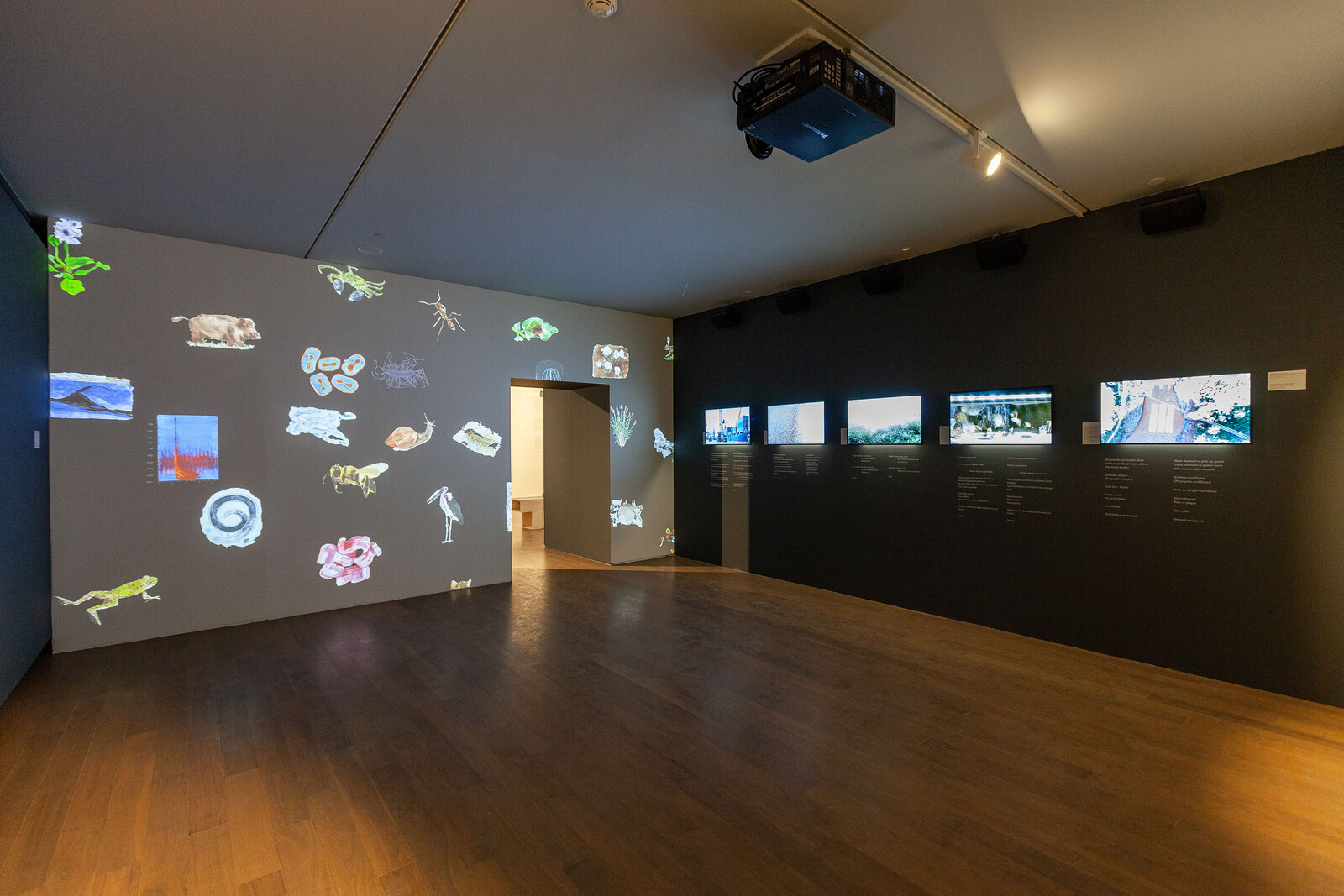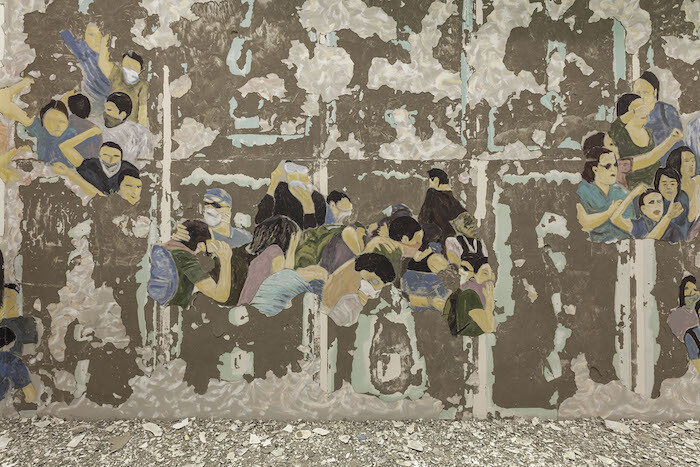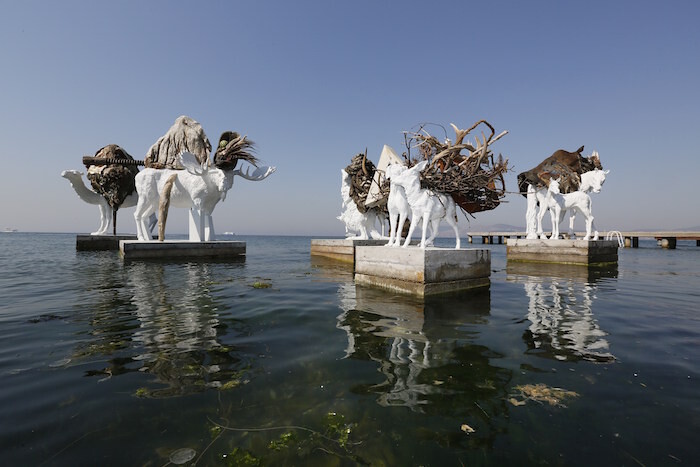Categories
Subjects
Authors
Artists
Venues
Locations
Calendar
Filter
Done
September 16, 2019 – Review
16th Istanbul Biennial, “The Seventh Continent”
Murat Alat

A psychiatrist friend once told me that most psychotic patients believe that they will see the apocalypse. If this argument is valid, nowadays either everyone is psychotic or the end of the world is really nigh. As a pessimist, I think both are possible.
The 16th iteration of the Istanbul Biennial, “The Seventh Continent,” is an exhibition about this deadlock. By considering the rise of fascism, misogyny, and the environmental crisis as indicators of this process, the exhibition displays the tragic results of human hubris but does not stop at this point. It creates new experiences and encounters to overcome the existing crisis. This biennial is not only an attempt to criticize society but also an attempt to establish new forms of being.
“The Seventh Continent” takes its name from the Great Pacific garbage patch—a gyre of mostly plastic debris, roughly 3.4 million square kilometers large, adrift in the Pacific Ocean. Curator Nicolas Bourriaud describes the exhibition as an anthropological study of this human-made territory. But the titular continent is more than an artificial landscape. It is, he claims, a way of living, a system of thought that has reached every part of contemporary life and attests to the inverted …
September 18, 2017 – Feature
15th Istanbul Biennial, “a good neighbour”
Jörg Heiser

Given the current political situation in Turkey, I wouldn’t have been surprised if the curators of this year’s Istanbul Biennial, Berlin-based artist duo Michael Elmgreen and Ingar Dragset, and IKSV, the corporate-funded foundation organizing the event, had decided to call the whole thing off. Since its first edition in 1987, the biennial has weathered numerous crises in Turkey. But this time, things are especially grim: in the wake of the attempted coup in July 2016, political purges have antagonized the country under the authoritarian rule of President Erdoğan. Tens of thousands of university teachers, hospital doctors, and judges have been dismissed while not only dozens of members of parliament have been imprisoned, but also hundreds of journalists. Artists have also been targeted, usually based on sweeping allegations ranging from insulting the president to supposedly supporting Kurdish terrorism: in March, the painter Zehra Doğan was sentenced to two years and ten months in prison for a picture in which she painted Turkish flags on buildings destroyed by the Turkish army in the Mardi province, a Kurdish region of Turkey; and in August the writer Doğan Akhanlı, who is a German citizen, was briefly detained in Spain due to an Interpol warrant …
September 7, 2015 – Review
“Saltwater: A Theory of Thought Forms”
Ana Teixeira Pinto

“Saltwater: A Theory of Thought Forms” takes its name and inspiration from the eponymous book Thought-Forms (1901) by the Theosophists Annie Besant and Charles Leadbeater, who, after the death of the prominent Theosophist Madame Blavatsky (1831–91), expanded and re-conceptualized her attempt to extrapolate Newton’s theory of color into a syncretic cosmology. According to Besant and Leadbeater, “thoughts are things,” and as such, they can manifest as visible auras. Thought-Forms is a detailed account of “what kind of thing a thought is,” in which Besant and Leadbeater document the “spiritual vibrations” which emanate from ideas, emotions, and sounds as visual shapes, colors, and forms. The book, whose illustrations are exhibited in what curator Carolyn Christov-Bakargiev calls “The Channel”—the nucleus of the exhibition, installed at Istanbul Modern, the biennial’s central venue, which plays a function akin to that of “The Brain” in Documenta 13—could be aptly described as a “a sort of spiritual synesthesia, as much a religious act as a neurological one.”
Materialization of psychic phenomena was a widespread obsession in late nineteenth-century occult circles. Around the 1870s, a plethora of psychics would claim to act as conduits or transmitters, which, much like a radio frequency receiver, could capture cosmic vibrations …
September 15, 2013 – Review
“Mom, Am I Barbarian?” 13th Istanbul Biennial
Elmas Deniz

Curator Fulya Erdemci has said that the focus of the 13th Istanbul Biennial, “Mom, Am I Barbarian?,” is “the notion of the public domain as a political forum.” The evocative title is borrowed from poet Lale Müldür’s eponymous book, with the obvious connotations of a sense of being an ultimate “Other,” one who cannot find a space to freely express him/herself in the above-mentioned public domain, in opposition to the classical notion of a “citizen,” imbued with various rights including the potential to be an actor in the public sphere. The problems of democratic public space, aggressive urban transformation, political engagement, collective living, and what role poetry and art might play in these realms are themes that the biennial orbits around. Given the events in Istanbul over the past few months, these would seem entirely promising and of-the-moment considerations. And yet this year’s biennial has charted its own retreat from Istanbul’s public space, and the contrast between this “within four walls” exhibition—showing eighty-eight international artists in five different venues—and what is going on outside is cacophonous.
As is by now well-known, in mid-May something quite unexpected happened in Turkey: the Gezi Resistance began. It started out as a protest by a …
September 20, 2011 – Review
"Untitled (12th Istanbul Biennial)"
Chris Sharp

Unlike most biennials, this is not so much an exhibition about what art can be, but about what it is. If there is anything radical about this exhibition, it is its refusal to conform to those biennial conventions that have come to characterize this particular exhibition format of the last decade: site or context-specific interventions or experimental projects of an overtly politically engaged nature, which often do not hesitate to subordinate formal or aesthetic considerations to political ones—including the dismissal of other conventions, such as the refusal to release the artist list before the opening and an avowed allergy to discursive biennial apparatuses—talks, panels, etc.—in favor of a straight exhibition. In other words, this is a formal biennial.
This formalism bears out in the two curators’ decision to use the work of Felix Gonzalez-Torres as their conceptual point of departure. Confining the exhibition to a single, museum-like, two-venue site, Jens Hoffmann and Adriano Pedrosa have concisely structured the biennial around five Gonzalez-Torres works— Untitled (Bloodwork—Steady Decline), 1994; Untitled (Ross), 1991; Untitled (Passport #II), 1993; Untitled (History), 1998; and Untitled (Death by Gun), 1990—from which they have distilled five themes. These themes, in turn, are used as jumping off points for considering …
